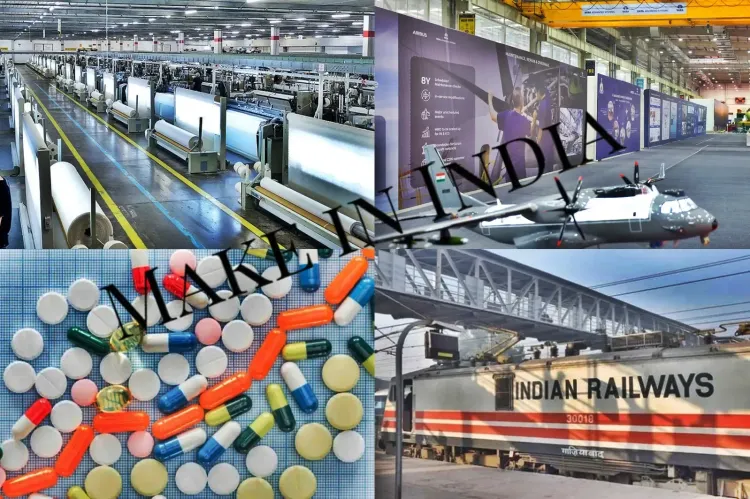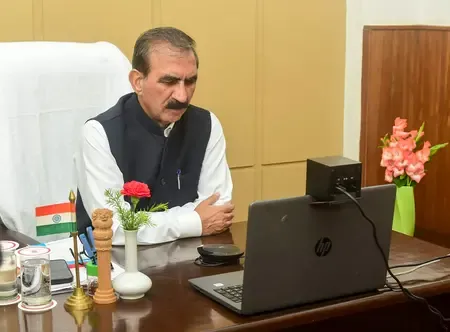Year End Review: A Decade of 'Make in India' Initiative Reaches New Heights in 2024

New Delhi, Dec 31 (NationPress) A decade since its inception, 'Make in India' has achieved remarkable milestones, and in 2024, the initiative further established itself as one of the most influential economic programs within the country.
With investments totaling Rs 1.46 lakh crore by August 2024, the initiative has led to Rs 12.50 lakh crore in production, Rs 4 lakh crore in exports, and the creation of 9.5 lakh jobs.
From April 2014 to March 2024, India attracted $667.41 billion in FDI, accounting for nearly 67 percent of the total FDI inflow over the last 24 years.
Exports have experienced a significant rise, exceeding Rs 4 lakh crore, bolstered by crucial sectors such as electronics, pharmaceuticals, and food processing.
In 2014, Prime Minister Narendra Modi launched the 'Make in India' initiative with an ambitious goal to transform India into a global manufacturing powerhouse.
The program aimed to rejuvenate the manufacturing sector, stimulate job creation, and bolster the nation’s economy by promoting local production.
Currently, 'Make In India 2.0' is fostering a robust manufacturing landscape across 27 categories with renewed enthusiasm and focus.
In the period of 2014-15, domestic mobile phone output was 5.8 crore units, which surged to 33 crore units in 2023-24, while imports significantly decreased. Exports reached five crore units, and FDI soared by 254 percent, demonstrating the scheme's effectiveness in enhancing manufacturing and investment.
In just the first seven months of FY25, iPhone production in India hit a remarkable $10 billion, with $7 billion in exports, setting a new record. Over the last four years, the Apple ecosystem has created 1,75,000 new direct jobs, with over 72 percent of these positions filled by women, according to government data.
The PLI scheme in the pharmaceutical sector has bolstered India’s standing in the global pharmaceuticals market, positioning it as the third-largest player by volume. Consequently, 50 percent of production is now directed towards exports, highlighting India's growing impact on the global pharma landscape.
Over 115 companies submitted applications, with 85 approved for incentives, projected to attract $8 billion (Rs 67,690 crore) in investments, significantly surpassing initial targets.
Recent data indicates India achieved 60 percent import substitution in telecom products through the PLI scheme, with global tech firms establishing manufacturing bases, making India a critical exporter of 4G and 5G telecom equipment.
Initiatives such as the announcement of design-led manufacturing of 5G products in the Union Budget 2022-23 and a 150 percent increase in FDI in the telecom sector from 2014 to 2021 have paved the way for sustainable growth and technological leadership in the coming years. The drone sector has also experienced rapid expansion, with turnover increasing seven-fold due to the PLI scheme.
In infrastructure, the PM GatiShakti initiative has reached a landmark with over 208 significant infrastructure projects worth more than $180 billion being assessed across various ministries.
This initiative has been vital in identifying and addressing 156 critical infrastructure gaps, especially in last-mile connectivity for essential sectors like coal, steel, fertilizer, and food distribution. Additionally, 434 projects along three economic corridors of the Ministry of Railways have been evaluated.
The robust foundation of PM Gati Shakti is driving exceptional growth in infrastructure investments. Morgan Stanley forecasts that over the next five years, these investments will grow at a 15.3 percent compound annual growth rate (CAGR), with total spending projected to reach $1.45 trillion.
The success of the platform has drawn global interest, with nations like Nepal, Bangladesh, Sri Lanka, Madagascar, Senegal, and Gambia expressing interest in adopting elements of the initiative.
The defence sector, a key priority of the Make in India initiative, has also made remarkable strides. India’s defence production has reached an all-time high of Rs 1.27 lakh crore in 2023-24, with exports to over 90 countries. India has witnessed a phenomenal growth in defence exports over the past decade, with figures increasing more than 30 times.
The recent opening of India’s first private military aircraft facility in Vadodara stands as a testament to the Make in India initiative. Situated within the Tata Advanced Systems Limited (TASL) campus, this facility will manufacture the Airbus C295 aircraft, marking a crucial advancement for India’s aerospace industry, manufacturing ecosystem, and defence capabilities.
At present, 65 percent of defence equipment is produced domestically, underscoring the nation's increasing self-sufficiency. This transition is supported by 16 Defence Public Sector Units (DPSUs), more than 430 licensed companies, and around 16,000 Micro, Small, and Medium Enterprises (MSMEs). Notably, 21 percent of this production is contributed by the private sector, which is a significant contributor to India's defence strength.
India’s defence exports have also experienced extraordinary growth, soaring from Rs 686 crore in FY 2013-14 to Rs 21,083 crore in FY 2023-24—an increase of over 30 times in just a decade.
The PLI scheme in the textile sector, with a projected investment exceeding Rs 28,000 crore, anticipated turnover of over Rs 2,00,000 crore, and proposed job generation of nearly 2.5 lakhs, aims to promote the production of MMF Apparel, Fabrics, and Technical Textiles within the nation to help the textile industry achieve scale and size.
Trade data indicates that India’s apparel exports witnessed a 35 percent year-on-year growth in October, while textile exports increased by 11.56 percent. Currently, India stands as the world's second-largest producer of textiles and garments, accounting for 4.6 percent of global trade and ranking as the third-largest textile exporter globally, following China and Germany.
In the Railways sector, as of December 2, 2024, 136 Vande Bharat trains with Chair Car Coaches are operational across the Indian Railways network. The introduction of these 136 Vande Bharat trains, a hallmark of Make in India, illustrates the nation’s capacity to deliver world-class, indigenously manufactured rail technology.
The Kavach system, designed to enhance train safety, has been deployed across 1,548 route kilometres (RKm) on the South Central Railway and North Central Railway. Currently, approximately 97 percent of the total Broad gauge (BG) network of the Indian Railways has been electrified.










